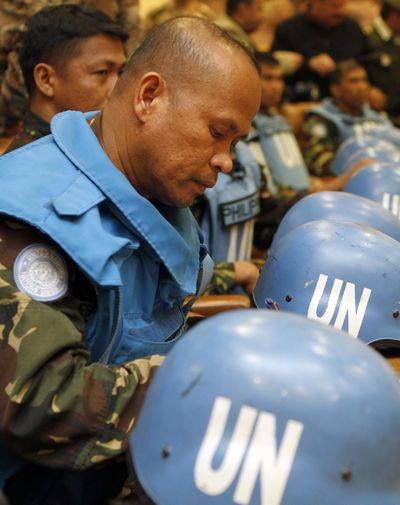U.N. peacekeepers freed
Rebels took 21 captive in Syria

BEIRUT – Twenty-one United Nations peacekeepers held by rebels in southern Syria were released Saturday and were safe in neighboring Jordan after a three-day ordeal that dramatized anew how the Syrian conflict has destabilized the region.
The U.N. confirmed the release and Secretary-General Ban Ki-moon issued a statement thanking “all concerned” for the troops’ liberation.
Video showed the peacekeepers, all of them Filipino, arriving Saturday in the Jordanian capital, Amman. They wore their signature blue helmets and vests and appeared to be in good health.
The abduction and continued violence in southern Syria raises questions about the future of the U.N. peacekeeping mission along the Syria-Israel border in the Israeli-occupied Golan Heights. The mission, which includes about 1,000 peacekeepers, had patrolled the zone for almost 40 years largely without incident until the Syrian civil conflict began to undermine security.
The abduction Wednesday was a major embarrassment for Syria’s fragmented opposition movement, which has received hundreds of millions of dollars in financial and material support from the United States and its allies, and is pushing for additional aid. The U.N. Security Council and the United States condemned the kidnapping and demanded the peacekeepers’ release.
It was the latest illustration of the lack of central command and coordination among the many armed groups fighting to oust the government of President Bashar Assad. A group calling itself the Yarmouk Martyrs Brigade seized the peacekeepers as they rode in a convoy on what the U.N. called a routine mission. Many armed factions in Syria appear to act autonomously.
The incident sparked deep concern in the Philippines, one of four nations that contribute troops to the Golan peacekeeping mission.
Another contributor, Croatia, has already indicated it will pull out of the mission. It was unclear whether the Philippines would follow.
The Philippine ambassador to Jordan was among those greeting the troops in Amman.
On Friday, the U.N. said two peacekeeper positions along the border had been vacated because the sites were vulnerable to gunfire. The mission “is being examined due to the degraded safety and security conditions,” it said.
The mission’s activities have been greatly curtailed and some nations have begun pulling out troops, Russia’s U.N. Ambassador, Vitaly Churkin, told reporters Friday.
The U.N. observer force has been in the area since 1974, after the 1973 Yom Kippur War. Israel and Syria agreed to an international presence to monitor the cease-fire line between them.
The drama began Wednesday when rebels detained the peacekeepers as they patrolled near the Syrian village of Jamla, scene of recent clashes between rebels and the Syrian military. In initial amateur video, the rebels accused the peacekeepers of siding with the Syrian government and said they would be held until the Syrian military agreed to stop shelling and withdrew from the area.
The U.N. said the peacekeepers maintained strict neutrality.
Exile representatives of the Syrian opposition, concerned about negative publicity, said the peacekeepers were not hostages.
Moaz Khatib, leader of the major opposition coalition, told CNN that the U.N. personnel were being held for their own safety because of heavy government shelling in the area.
The U.N. had been involved in extensive negotiations to free the peacekeepers. A U.N. plan to bring the troops out of Syria on Friday was canceled because of heavy shelling in the area.
On Saturday, reports indicated that it was the rebels themselves who brought the 21 peacekeepers to the Jordanian border and handed them over to Jordanian authorities.